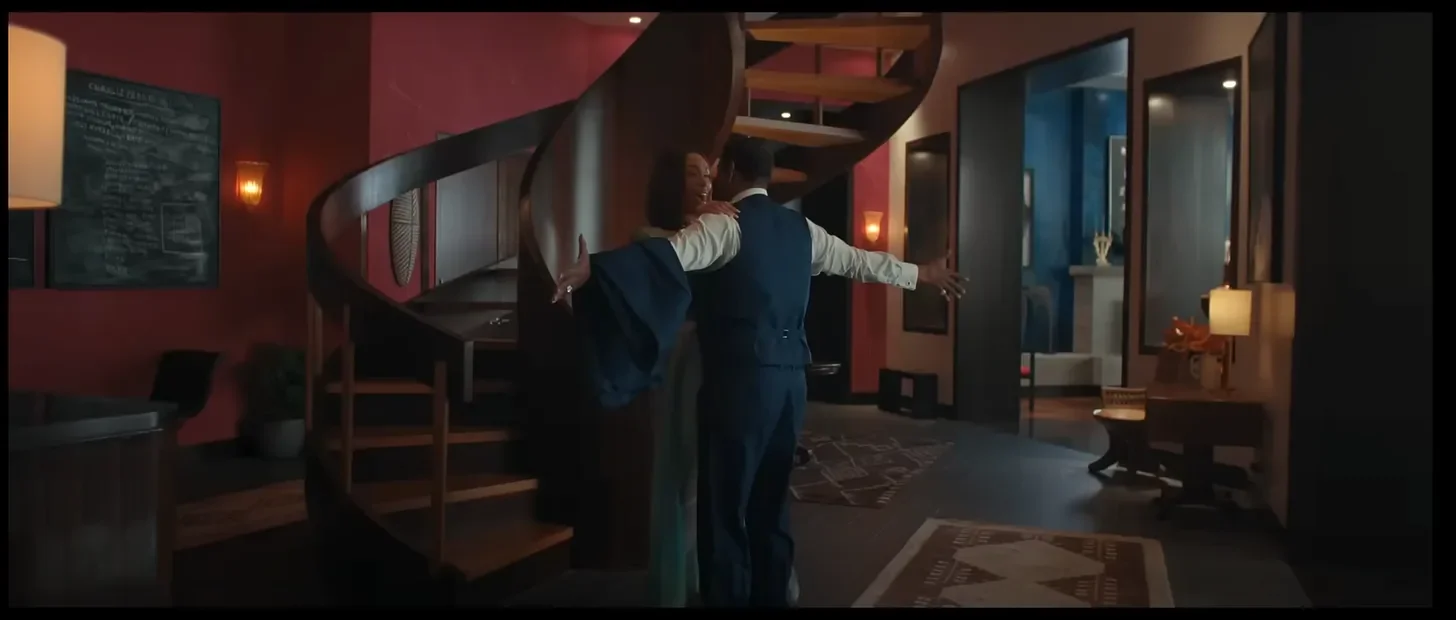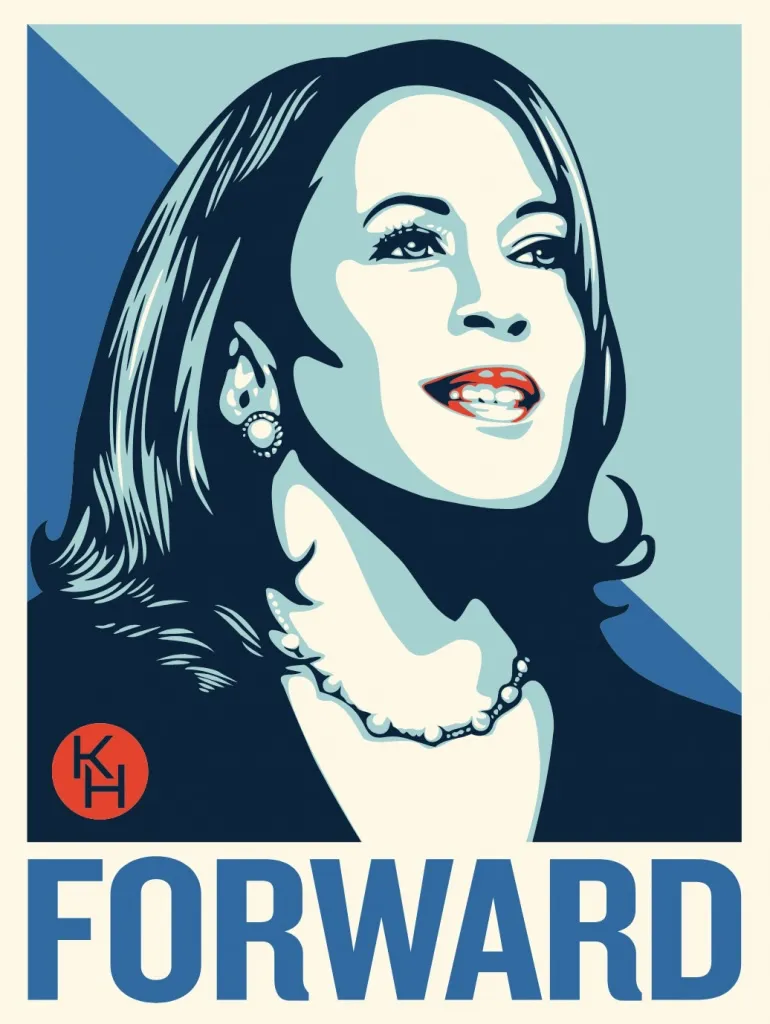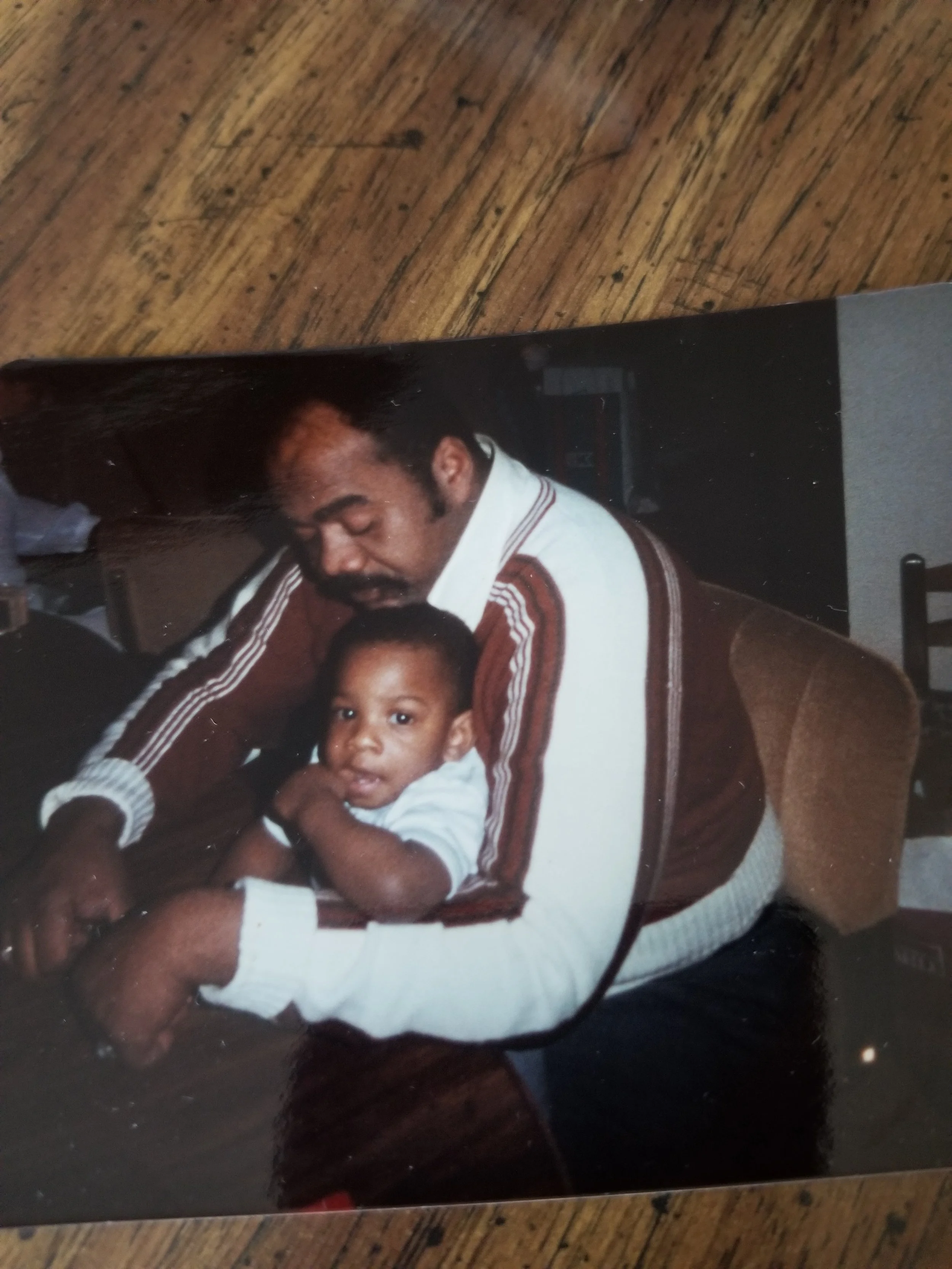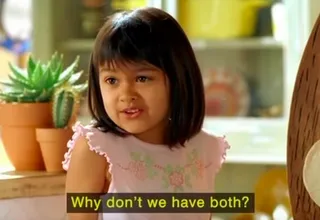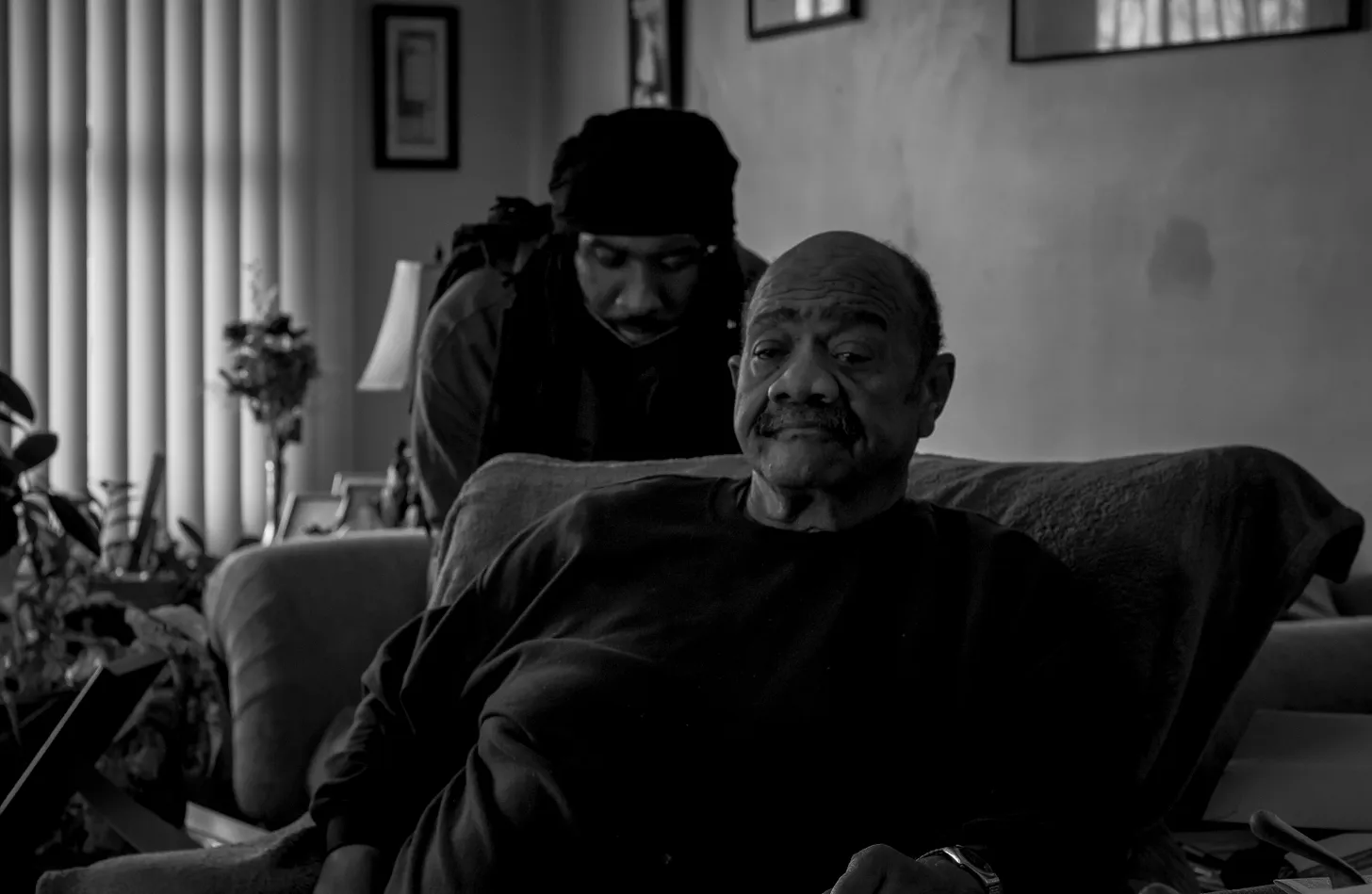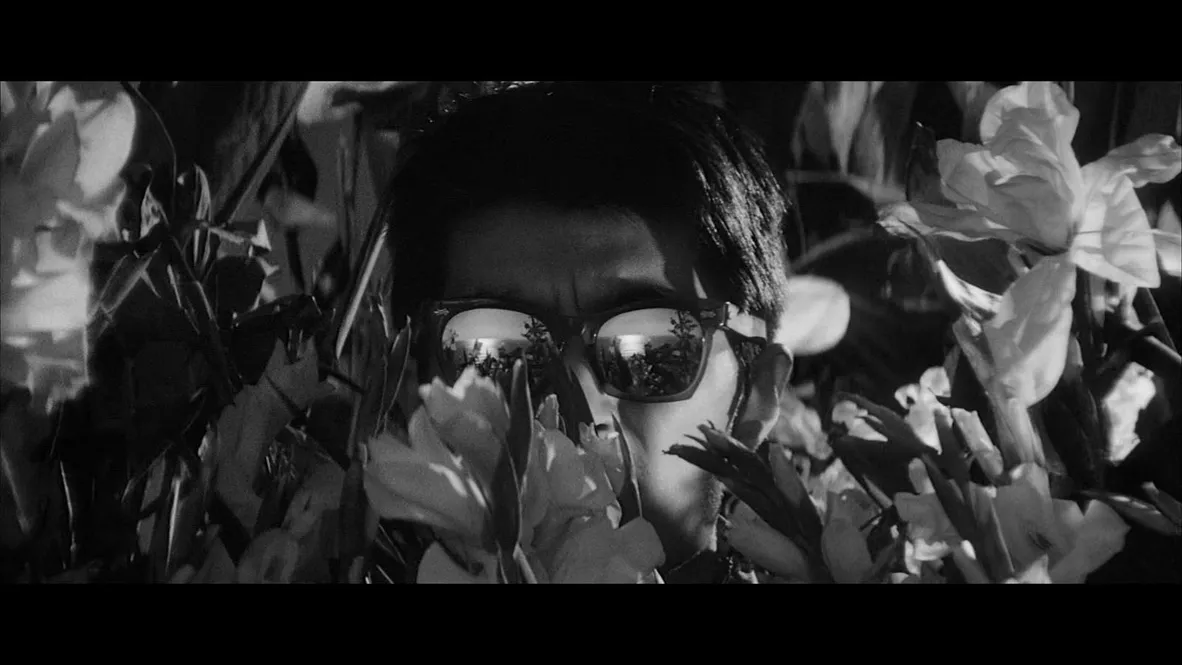Highest 2 Lowest: Black & Bougie?
Shot from Highest 2 Lowest
Thanks for reading! Subscribe for free to receive new posts and support my work.
Spike Lee's fifth outing with Denzel Washington, highest 2 lowest, is a very BLACK movie. It is also a depiction of the bougiest negroes I've seen on screen since probably the Cosby Show (Or Whitley Gilbert). The weird thing is, though, I got most of the references to "high” Black American culture; the home screen on my iPad is the steely-eyed portrait by Japanese-Canadian artist Tim Okamura (an interesting choice, considering that Lee is re-interpreting a Japanese film)
Photo of the Tim Okamura painting (left), My current iPad background (right)
that we see innumerable times in the main character, David King's (Denzel Washington) living room/parlor/dining room (I did not grow up in a luxury two-floor penthouse, so I am not sure what some of those rooms would be called). I didn't quite grow up in the same conditions as the film's main antagonist (ASAP Rocky), but somewhere in between, so while I had access to some of the middle-class Black experience, it was far from the opulence of the King family's penthouse. This made me ask myself: “Am I now a bougie negro?” And if so, when did that happen?”
I remember my father telling me that I had "Cadillac tastes” as a child because I asked for a lot of books, video games, and video game systems. This was because I couldn't safely play outside and didn't have siblings my age to play with. That may sound strange to hear from someone who grew up in the City of Chicago. Still, the virtually all-black neighborhood I am from (West Pullman) was effectively cut off from the wealth, transportation, activities, and safety that a "global city” like Chicago had to offer. I am guessing that because we were surrounded by death, the public health crisis of the crack cocaine epidemic, and because we had seen children murdered in the streets without any accountability from our neighbors or the police, my parents, and moreso my father, concentrated on survival in a purely physical sense. I suppose it can seem ridiculous to have your 10-year-old child, who, when the first time he rode his bike around the corner had a grown man hold a gun to his head and tell him “if I see you on this corner on that bike, I will blow your fucking head off” then ask to visit a sushi restaurant or attend a video game conference that his priorities aren't in the right place.
In Highest 2 Lowest, we only get hints of what Kind's upbringing was like through conversation about being from the Bronx, being nice with his hands, and being proficient with a pistol, but the film really doesn't elaborate on his upbringing. This is in contrast to King's counterpart in the film, Highest 2 Lowest, which reinterprets the 1963 movie High and Low (literally Heaven and Hell in Japanese, which title I like much better). Kingo Gondo, portrayed by the legendary actor Toshiro Mifune, almost literally did get it out the mud, as he was raised in the slum areas that his giant modern, western-style house overlooks. In both cases, these characters, who came from humble and maybe precarious backgrounds, embraced very visual forms of opulence that were seen as offensive to not only their foils, but also less wealthy people that they interacted with, who are also from their community (in King's case, Black New Yorkers, and in Kingo's case, working and lower class Japanese peoople in the area he lived in).
I am by no means a rich person, and I am not the kind of person to be flashy even if I were. Still, watching both of those movies and thinking about my connection to them through my upbringing, I found some of the messages from Lee's version of this morality play to be somewhat troubling. Where Kurosawa's film was an effective critique of Japan's post-war urban society (although it falls short on gender, and neither does Lee's film), Lee's film came off as a celebration of the middle-upper to upper-class Black American ethos. For the most part, Spike Lee is not a subtle filmmaker; if he refers to something in Black American culture, he is going to throw it in your face, and in multiple scenes, beatify people through imagery of Aretha Franklin, James Brown, Kamala Harris, Kehinde Wiley, and Toni Morrison, to name a few.
The Kamala Harris campaign poster that was placed (confusingly) in the room of a teenager in Highest 2 Lowest
While Lee denies that King's portrayal of a flamboyant and image-conscious artist who is starting to get up in age is autobiographical (as Wesley Morris hypothesized on a recent podcast about the movie), it is hard to believe that his values are not suffused throughout the story. Even though King is giving some Diddy vibes, for the most part, he is portrayed in a heroic light, and he not only gets the better of his nemesis in the film financially and legally, he also beats his ass handily even though he is like twice A$AP Rocky's character's (named Yung Felon by the way; as I said earlier, Lee is not subtle) age when they finally confront each other.
Again, while I am familiar with these bougie negro class cultural markers that the King family represents, I don't really get down with how they are living and their relationship to the Black community in the film. While one could argue that it should be the police's job to recover a kidnapped teen, it is striking to see how many resources are given to the King family first to recover Trey King (played by Aubrey Joseph) and second, to recover the $17 million dollar ransom that King pays to the captor of the kidnappee. It also seemed to be, in the world of the film, a front-page news story, which is wild to see for a Black family, no matter how rich they may be.
But then, when it turns out they have the wrong kid, whose father is King's driver, Paul (a subdued yet layered performance by Jeffrey Wright), the cops are openly disdainful and often hostile to the lower-class man, even though they were all gung-ho about how imperative it was to recover Trey King (and of course the money). I am aware that this movie, the Kurosawa version, and the original novel, King's Ransom (which I did not read, in full disclosure), are meant to question the moral responsibilities of the wealthy to the non-wealthy people adjacent to them, but Highest 2 Lowest does not question the underlying power structures of wealth and accumulation and the harms it does; in my view, it seems to admire them.
Big Mike and me (at this point, Little Mike)
As a child, and even now, I was not interested in “expensive” things because they were expensive; I was interested in the wider world in general because the physical spaces I was allowed to occupy were so limited, and I knew there was more out there than what I was experiencing. I don't think my father understood that because of how he was brought up. His father was a very stern and cold man who was born in Mississippi around 1912 and was given away as a small child because his parents could not afford to take care of him. He ended up in Chicago, and from what I was told, took work and the church very seriously, but did not have much time for warmth towards his children. He was a very practical man, one who had to survive off of beans for so long that he refused to eat them once he had the means not to do so.
I cannot imagine that my father will ever talk to me about this. Still, to me, it seems that in the face of raising a child in such precarious conditions, and that his father was so no-nonsense, he didn't consider that his offspring would be so different and want different things from life. I always had food, electricity, clean clothes, shelter, and other perks (such as a TV in the bedroom, video game systems, and books), so I am not saying that my parents failed to raise me into adulthood. I know it was very difficult, and I appreciate their sacrifices. Still, ironically, through the stories I read and watched, I developed an “adventurous nature” (in my father's words) that he didn't understand and found troubling. My parents ensured that I understood what it means to be a Black person living in America and taught me to have a sense of pride in that. However, my parents, especially my father, reflected some of the respectability politics that Lee promotes through the movie's narrative. This tension seems to be generational, and I get it. My parents were raised by Black people who grew up before the Voting Rights Act (although we may be living through the end of the VRA as we speak, but that is another topic). My father has actually met enslaved people, and when he was a kid, he was in Mississippi visiting his grandparents when Emmett Till was lynched, not too far away from where they lived (that was the last time he went there as a child).
While my mother was more aspirational, and I got a lot of that from her, my father internalized a will to survive, but not a will to thrive. This is not judgment from my part, but like the meme, "why not both?”
I'm not sure if this is true of my parents, but I have always had a natural inclination to manifest things that I imagine, whether through drawing, painting, writing, photography, or other means. I spent a lot of time reading about people who did that because there were no people in my household who talked about things like that. This tension created a deep disappointment and maybe even jealousy in my father, as he likely felt that he could not afford such luxuries. I feel sympathy for him, yet I don't absolve him of not understanding that there is nothing wrong with wanting to see a world outside of the limitations that have been imposed upon you.
Big Mike and son
I did not mean to write so much about Big Mike, but this is key to my experience and understanding of Highest 2 Lowest. We only see David King at his peak. The events of the movie appear to unfold over a few days of a long life (especially for a Black man in the US). At the end, we see him, his not-quite age-appropriate wife, and his son, dripped out in very expensive clothes, in their very expensive penthouse, with a light-skinned woman singing for them, almost literally for her supper. There is no challenge to the status quo; the wealthy (Black) family remains comfortable and affluent, as powerful as ever, while Yung Felon literally becomes a felon, and Paul, his formerly incarcerated, seemingly much less well-off friend/employee, is recovering from getting shot while helping King get his money back. We also never learn how Paul's son, Kyle, the one who was actually kidnapped and beaten, deals with the trauma of what happened to him. Instead of questioning the responsibility that the wealthy have to poorer people and society in general, Lee presents a picture of survival and thriving from the perspective of an already powerful man. King is vindicated, he is back on top, and everything is going to be okay…as long as you tune out the suffering of those below you.
Scene from High and Low, or Heaven and Hell by Akira Kurosawa
As much as I loathe to admit it, I found Kurosawa's version to be more salient to the issues of inequality. Don't get me wrong; I thought Highest 2 Lowest was an entertaining film, Denzel was great, and I am always going to champion Black culture, as I love the culture I was raised in, despite the challenges we face as a people and a diaspora. And it is because of the love (and the same love for my parents) that I want us to do better and discuss and strategize how we can improve for ourselves as a community. My father may disagree, but I don't think it is bougie at all to want to take an active part in the wider world. We have as much right to do so as anyone else and we owe it to ourselves to seek that out, if we so wish.
